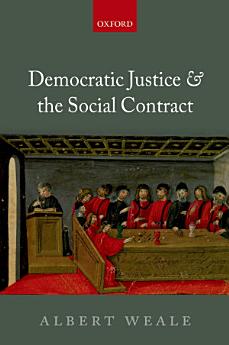Democratic Justice and the Social Contract
Aug 2013 · OUP Oxford
Ebook
328
Pages
family_home
Eligible
info
reportRatings and reviews aren’t verified Learn More
About this ebook
This book offers a theory of democratic justice. According to the theory, justice emerges from collective agreement among political associates who enjoy approximate equality of power. Such situations can be seen as social contracts, and we find an empirical model for social contracts in the examples of successful common property resource regimes. In these regimes, participants craft collective rules of access to the means of production on an equal basis and producers are entitled to the full fruits of their labour. To interpret this theoretically an account of practical rationality in terms of individual and public deliberation is required. In tracing the move from small scale to large scale societies, three important transformations become apparent: in political institutions; in the economy; and in the functions of the household. All are relevant to the understanding of justice. In great societies representative parties making policy and law in shifting coalitions in parliaments elected by proportional representation exemplify political equality and so instance one form of democratic justice. In the economy corporate hierarchies modify the full fruits principles, not always in the direction of justice. Redistribution is justified as a means of smoothing income across the life-cycle, rather than by appeal to economies of scale or a simple principle of need. The sense of democratic justice requires commitment to the maintenance of those institutions that protect common interests, whilst acknowledging where there are differences of interest. This sense of democratic justice needs to be upheld by effective governance.
About the author
Albert Weale is Professor of Political Theory and Public Policy in the School of Public Policy, University College London. He was previously Professor of Government and co-editor of the British Journal of Political Science at the University of Essex, and has also held positions at the University of East Anglia, the University of York, and the University of Newcastle upon Tyne. His research and publications have been concentrated on issues of political theory and public policy, especially the theory of justice and the theory of democracy, health policy and comparative environmental policy. In 1998 he became a Fellow of the British Academy and was one of its Vice-Presidents from 2007 to 2012, acquiring special responsibility for public policy matters.
Rate this ebook
Tell us what you think.
Reading information
Smartphones and tablets
Install the Google Play Books app for Android and iPad/iPhone. It syncs automatically with your account and allows you to read online or offline wherever you are.
Laptops and computers
You can listen to audiobooks purchased on Google Play using your computer's web browser.
eReaders and other devices
To read on e-ink devices like Kobo eReaders, you'll need to download a file and transfer it to your device. Follow the detailed Help Center instructions to transfer the files to supported eReaders.






